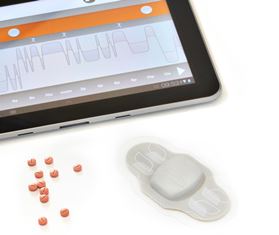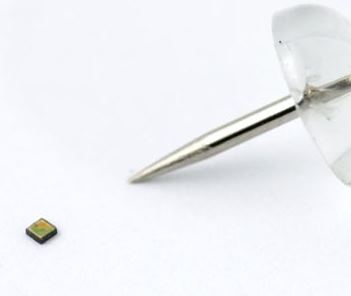Trial of 'digital medicines' in the north of England
10 March 2014
The Northern Health Science Alliance (NHSA), an alliance of universities, hospitals and Academic Health Science Networks in the north of England, is working with US company Proteus Digital Health to test if taking pills with ingestible sensors can help patients take medicines properly.
An ingestible sensor is added to a pharmaceutical product and swallowed by the patient. The sensor is activated in the stomach and provides vital information about if and when the medication has been taken, as well as how their body is responding to treatment, via an electronic patch the patient wears like a plaster. The aim is to enable more effective monitoring of patients and empower individuals to take charge of their health using these 'digital medicines'.


The UK Government estimates that unused prescription medicines cost the NHS in England up to £300 million, and it is expected that much of this wastage occurs when patients stop taking their medicine without telling their doctor. This also has further implications for the patients’ health, as they are potentially putting themselves at risk of costly future complications without realising it.
The scale of the NHSA’s reach — across eight universities, eight leading hospitals and four AHSNs — gave it the edge against competitors across the world to bring the initiative to the UK. The partnership will also create 200 highly skilled jobs as Proteus Digital Health opens its first international manufacturing site in the UK, which will serve as a new hub for the global digital medicines industry.
Dr Hakim Yadi, Chief Executive Officer of the Northern Health Science Alliance, commented, "We are delighted to be working with Proteus to pioneer the use of this technology in the North of England to the benefit of patients and the NHS. Our lives are becoming increasingly digital, a variety of sectors have already undergone fundamental changes through the introduction of innovative digital approaches. Healthcare is clearly the next sector to benefit from such changes.”
Andrew Thompson, President and Chief Executive Officer of Proteus Digital Health, said, “The NHSA's ability to reach thousands of patients was a key factor in our decision to base this work in the UK. Through this partnership we gain valuable understanding about how to introduce this new technology on a large scale and NHS patients will have the opportunity to benefit from early access to digital medicine.”
Dr. Mark Treherne, Chief Executive
Officer of UKTI’s LSIO commented:
“This move signifies an
exciting new opportunity and the growing momentum of
transformational healthcare technology, which is fantastic news for
the patients and businesses across the UK. Having a company of
Proteus Digital Health calibre operating in the UK is a huge
testament to the life science ecosystem and the global lead that the
UK takes in supporting the adoption of new innovative products.”